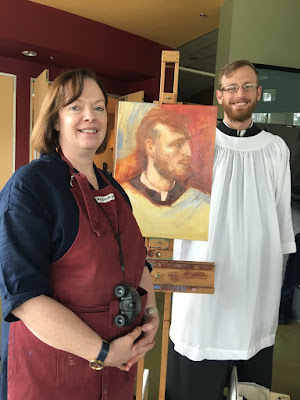How one Studio Art alumnus continues to follow his passion and maintain a steady career painting
 Michael Gillespie (B.F.A., Art Education, 1983) recently completed the biggest portrait commission of his career — a portrait of Ray and Nancy Hunt, of Hunt Oil Co., in Dallas. He described the work as a “rare honor.” Over the years, he’s worked as an artist and teacher in various capacities. The Dallas-based painter took time to speak with the College of Fine Arts about how he continues to grow as an artist and how he stays involved and excited in his craft.
Michael Gillespie (B.F.A., Art Education, 1983) recently completed the biggest portrait commission of his career — a portrait of Ray and Nancy Hunt, of Hunt Oil Co., in Dallas. He described the work as a “rare honor.” Over the years, he’s worked as an artist and teacher in various capacities. The Dallas-based painter took time to speak with the College of Fine Arts about how he continues to grow as an artist and how he stays involved and excited in his craft.Tell me a little bit about your career, art and otherwise, and what you’re up to these days.
I was doing church music before studying art at UT. When I graduated with a B.F.A., I worked as an illustrator for several years and continued as church choral director part time. I always had a knack for “getting a likeness,” and gradually started doing more portrait commissions as the illustration market died away. There’s something about drawing or painting a human face that fascinates me, even though I also enjoy figure painting and drawing. I also do a lot of outdoor plein air painting of landscapes, some of which I sell online, and some in a gallery.
Like most artists, I have done various things to pay the bills. I currently teach part time at Dallas Baptist University, a survey course called “Introduction to Fine Arts,” for non-arts majors. And I do some small group teaching in my community.
I was artist-in-residence at a five-star hotel in Italy for a month a couple of years ago, where I taught guests and sold some paintings. I plan to return to Italy to paint this summer.
Is there a type of painting you particularly enjoy?
Most of my work is done in oil or pastel, but I sometimes experiment with watercolor. Portrait painting seems to be an art form that is more popular in the deep south, by tradition. Otherwise, it’s mainly for high-profile people. Most people think of photography first to capture someone’s likeness.
 I do a commissioned portrait about once per year now. An artist’s work evolves over time, and I am becoming more interested in figurative work that is more personal. For example, When David Heard was inspired by a choral composition on the same theme. It’s about the Biblical David lamenting the death of his son. The painting is done in a very realistic style. I have won several awards for it, and it was sold. One thing that has helped me through the years is the amount of figure drawing that was required at UT. I think training the eye that way is extremely valuable for art students, whatever genre they pursue.
I do a commissioned portrait about once per year now. An artist’s work evolves over time, and I am becoming more interested in figurative work that is more personal. For example, When David Heard was inspired by a choral composition on the same theme. It’s about the Biblical David lamenting the death of his son. The painting is done in a very realistic style. I have won several awards for it, and it was sold. One thing that has helped me through the years is the amount of figure drawing that was required at UT. I think training the eye that way is extremely valuable for art students, whatever genre they pursue. 













